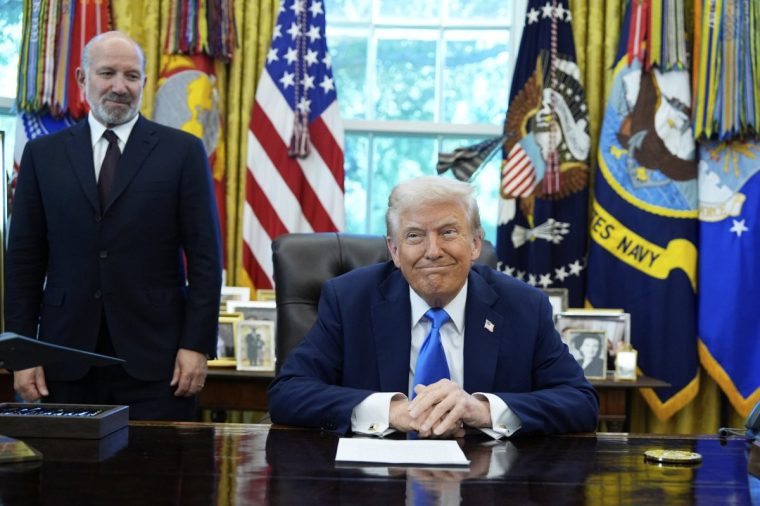The US President will regret his announcement on H1-B visa holders when he realises it is torpedoing the interests of America’s wealthiest business owners
WASHINGTON DC – Top White House officials spent the weekend trying to repair the damage caused by President Donald Trump’s shambolic announcement on Friday regarding the future of visas for skilled overseas workers hired by American companies.
Alongside his Commerce Secretary Howard Lutnick, Trump unveiled a new, extortionate message to the foreign-born employees and the US businesses that rely on them: pay up, or ship out. But his decision to apply a starting price of $100,000 (£74,211) annually for recipients of the coveted American H1-B visa was met with fury at home and abroad, and caused a mad scramble by the White House to row back on some of the announcement’s key details.
Lutnick portrayed the existing 700,000 H1-B recipients as shysters who have been ripping the country off. The President’s initiative, he told reporters on Friday, would “stop the nonsense of letting people come into this country on…visas that were given away for free”. He inferred that key economic sectors – healthcare, tech, hospitality – have benefited from inward flows of foreign-born workers, and that in the process they have been stealing jobs from Americans. Five times during Friday’s presentation, he insisted the $100,000 fee would be levied annually on each H1-B employee hired to work in the USA.
“Either the person is very valuable to the company and America, or they’re going to depart”, proclaimed Lutnick. He ordered US corporations to “stop bringing in people to take our jobs…hire Americans, and make sure the people coming in are the top, top people”.
Corporate executives and foreign governments spent the weekend contemplating the worst-case scenario: if Trump’s executive order on the matter survives inevitable legal challenges, it threatens to slow America’s economic growth and significantly deepen hostility towards his administration in key capitals worldwide.

Annually, around 85,000 H1-B visa applicants are granted permission to enter the United States via a lottery process, and bring their skills to many of the country’s leading corporations. Annually, approximately 2,000 British citizens are among those granted the coveted travel document.
Amazon, Apple, Meta, Google, JP Morgan and Deloitte are among the top employers of H1-B recipients. They argue that American’s reputation for innovation and scientific research has been largely rooted in the skills that H1-B holders bring to their respective industries and they have skills that few members of the American workforce offer. During his time at the President’s side Elon Musk lobbied Trump publicly to abandon his threats to upend the programme.
In the medical field alone, Trump’s plan threatens to leave hospital systems, research centres and teaching schools facing a nightmarish choice: continue to bring skilled workers into the industry by paying the government $100,000 a year for each H1-B visa holder they employ or else recruit less-qualified American staff.
Dr Nick Mark, a critical care internist and host of the Critical Care Time podcast, called Trump’s plan “absolutely devastating”. Noting that around one third of resident doctors in the United States were international medical graduates, and around a quarter of the country’s 43,000 residency jobs were filled by H1-B visa holders, he warned on social media that “no hospital will pay a $100,000 fee for a $55,000 resident salary”.
Tech firms – particularly those in the thriving AI or quantum computing sectors celebrated by Trump during last week’s state visit to the UK – may have the financial wherewithal to stump up the cash that the White House is demanding. But as Musk’s intervention made clear earlier this year, even tech executives on board with Trump’s general approach to governance fear the US simply lacks enough qualified staff to fill the void that is about to be created.
For India, already reeling from Trump’s punishing tariffs, the H1-B announcement came like a bolt from the blue. Prime Minister Narendra Modi has often publicly celebrated the contributions that H1-B visa holders from his country have played in building America’s economy and indicated that he views them as a crucial pillar of the two countries’ relationship. He was reportedly blindsided by Trump’s announcement, which came at time of rapidly growing détente between India and China. At airports in the United States and India on Saturday, the announcement sparked chaos, with H1-B visa holders scrambling to determine how it might affect them.
Late on Saturday, White House press secretary Karoline Leavitt issued a “clarification”. Despite Lutnick’s insistence to the contrary, the $100,000 would only be applied once, not annually, and the fee will only apply to new H1-B applicants, not existing visa holders.
The weeks ahead are likely to see enormous pressure for a fuller White House U-turn, much of it from the very titans of tech who only a fortnight ago met Trump and publicly pledged fealty to him during a White House “Rose Garden Club” dinner. They will remind the President that last December, he suggested overseas students graduating from American universities with skills useful to America should be permitted to remain in the United States and help build its industries.
Now, just eight months after his inauguration, the arch-protectionist in the White House has turned, beguiled by suggestions that his own government can make some fast money out of skilled workers the US economy desperately needs.
